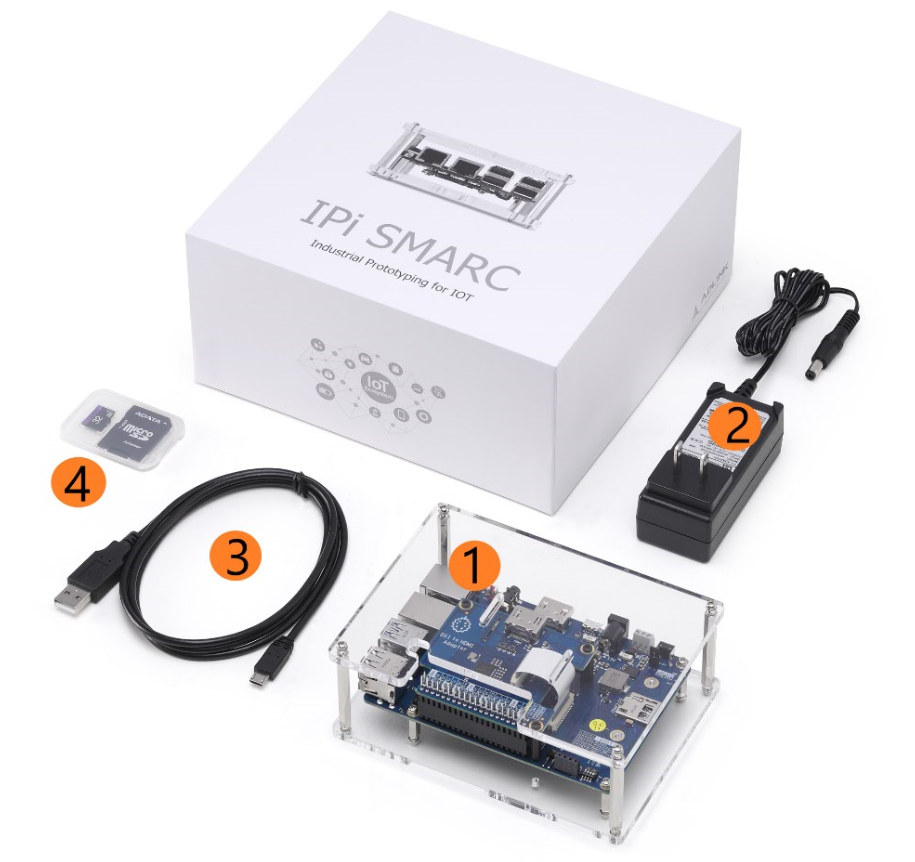ADLINK Technology has just announced the Industrial-Pi (I-Pi) SMARC Development Kit to help engineers quickly design prototypes for industrial applications using peripherals and sensors.
The I-Pi SMARC development kit is comprised of a baseboard, LEC-PX30 SMARC-compliant Rockchip PX30 system-on-module, an acrylic case, a 12V/2A power supply, USB cable, and a 32GB MicroSD card. The company promotes the kit as “an industrial-ready substitute for Arduino and Raspberry Pi (RPi) platforms that are commonly used for prototyping but cannot typically be ‘dropped’ into an industrial solution as-is“.
LEC-PX30 SMARC System-on-Module
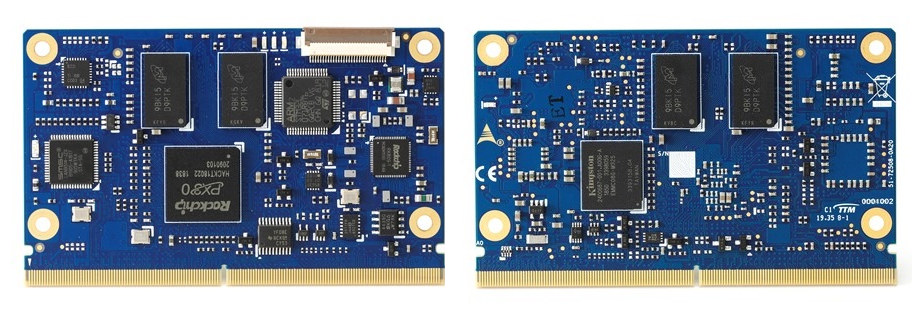
Specifications:
- SoC – Rockchip PX30 Quad-core Arm Cortex-A35 CPU with TrustZone technology, ARMv8 Cryptography Extensions, Mali-G31 GPU
- System Memory – 1GB or 2GB DDR3L at 1066/1333 MHz
- Storage – 8, 16, 32 or 64 GB eMMC flash
- Connectivity – 10/100M Ethernet from SoC, 10/100M Ethernet via LAN9514 USB 2.0 Ethernet controller
- Video
- Decoding – H.264 up to 1080p60, H.265/HEVC up to 1080p60, MPEG-4, ISO/IEC 14496-2, SP @ L0-3, ASP @ L0-5, up to 1080p60
VP8, up to 1080p60 - Encoding – H.264 video encoder at BP/MP/HP @ level 4.2, 1920×1080 @ 30fps, 1x 1080p @ 30fps or 2x 720p @ 30fps encoding
- Decoding – H.264 up to 1080p60, H.265/HEVC up to 1080p60, MPEG-4, ISO/IEC 14496-2, SP @ L0-3, ASP @ L0-5, up to 1080p60
- 314-pin MXM 3.0 edge connector as per SMARC specification:
- Video Output – 4-lane MIPI DSI up to 1080p60, optional 24-bit LVDS single channel up to 1280×800 @ 60fps
- Camera Input – 4-lane MIPI CSI up to 1.0 Gbps
- Audio – 2x I2S interfaces with audio resolution from 16-bits to 32-bits and sample rate up to 192KHz (via on-carrier ES8316 codec)
- Connectivity – 2x Fast Ethernet
- USB – 4x USB 2.0, 1x USB OTG
- Serial – 2x UART interfaces (TX/X/CTS/RTS), CAN 2.0B only or mixed CAN2.0B & CAN FS mode up to 8 Mbps
- 2x SPI (one occupied by SPI-to-CAN controller ), 4x I2C,
- 12x GPIO with interrupt, one GPIO with PWM
- 1x SDIO (4-bit) compatible with SD3.0, MMC ver. 4.51
- IoT security
- Cryptographic co-processor with secure hardware-based key storage for sign-verify authentication provides Internet of Things (IoT) Protected Storage for up to 16 keys, certificates or data
- ECDH: FIPS SP800-56A Elliptic Curve Diffie-Hellman NIST standard P256 elliptic curve support
- SHA-256 & HMAC hash including off-chip context save/restore
- AES-128: encrypt/decrypt, galois field multiply for GCM
- SEMA Board Controller – Voltage/current monitoring, boot configuration, logistics and forensic information, flat panel control, watchdog timer
- Debugging – 30-pin flat-cable connector for use with optional DB-30 debug module prvoding JTAG, BMC access; UART, power testpoints; diagnostic LEDs, Power, Reset, Boot configuration
- Dimensions – 82x50mm “Short Size” SGET SMARC Specifications v2.0
- Temperature Range – Standard: 0°C to +60°C; rugged: -20°C to +85°C
- Humidity – 5-90% RH operating, non-condensing; 5-95% RH storage (and operating with conformal coating)
- Shock and Vibration – IEC 60068-2-64 and IEC-60068-2-27, MIL-STD-202 F, Method 213B, Table 213-I, Condition A and Method 214A, Table 214-I, Condition D
- HALT (Highly Accelerated Lifetime Tests) – Thermal Stress, Vibration Stress, Thermal Shock and Combined Test
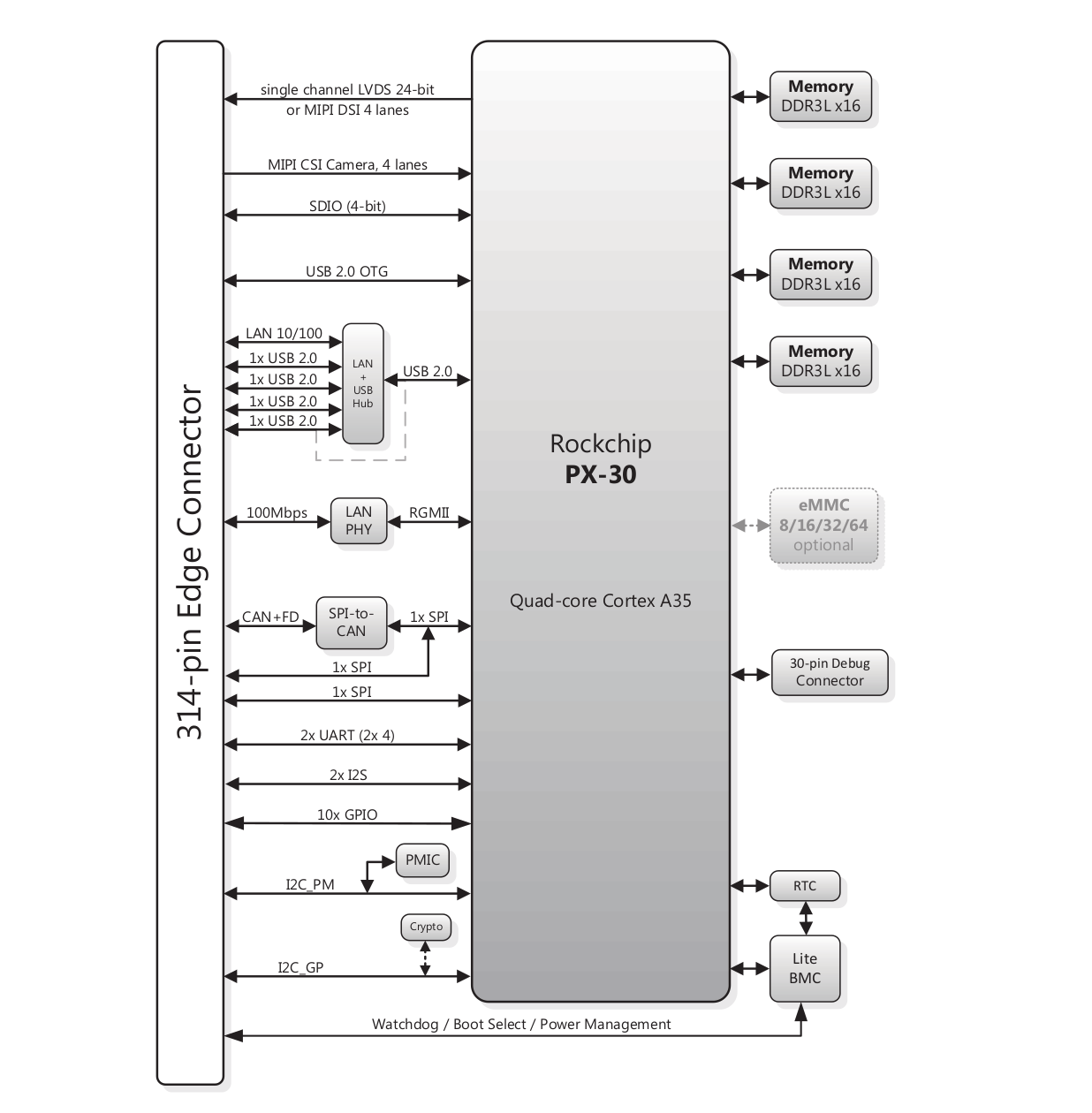
The company provides support for Yocto Linux BSP and Debian Linux, and can provide an Android 8.1 BSP on request. You’ll find more details on the product page and the company’s Github account with, for instance, the Yocto layer for the company’s Rockchip PX30 based Computers-on-Module. There’s also a separate adlink-doc Github account with documentation…
I-Pi SMARC Development Kit
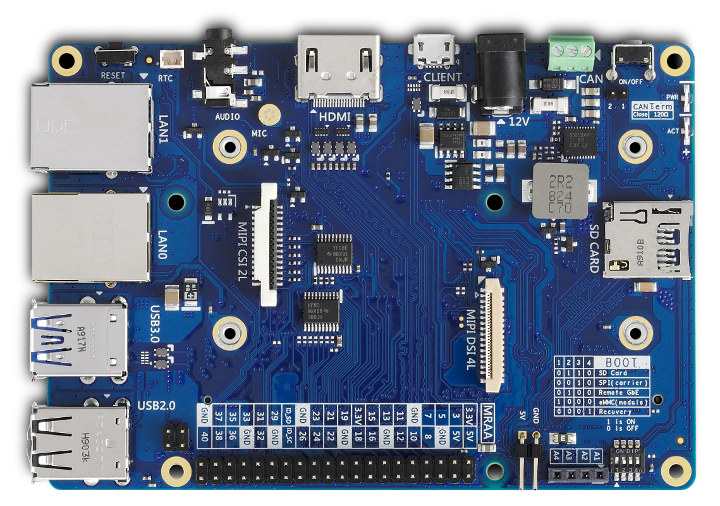
ADLINK Industrial-Pi SMARC development kit specifications:
- SoM – LEC-PX30 SMARC SoM described above
- Storage – MicroSD card slot (bootable)
- Video Output – HDMI port, MIPI DSI connector
- Audio Output – 3.5 mm audio jack, digital audio via HDMI port
- Camera – MIPI CSI connector
- Connectivity – 2x Fast Ethernet (RJ45) ports
- USB – USB 3.0 port, USB 2.0 port, 1x Micro USB OTG port
- Expansion
- 40-pin Raspberry Pi compatible expansion header
- ADC header – 4x analog inputs
- 3-pin CAN bus terminal block
- Misc – BOOT select DIP switch; power & reset buttons
- Power Supply – 12V/2A via power barrel jack
- Dimensions – TBD
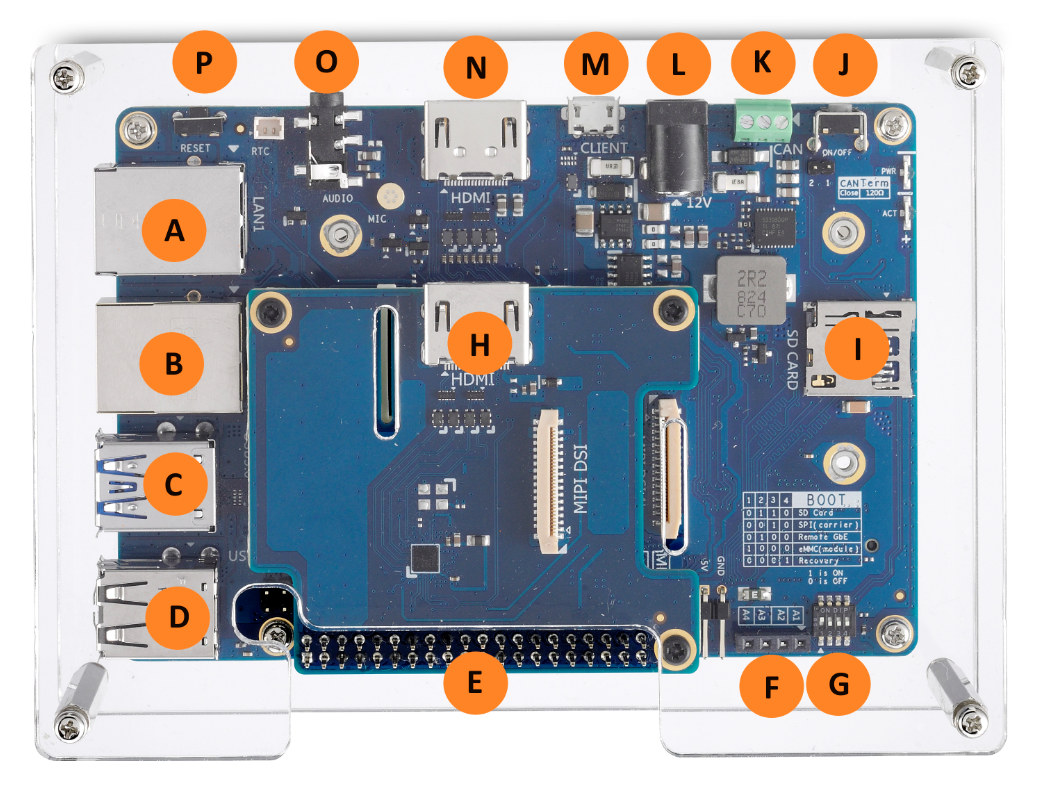
If you look at the photo above you’ll see two HDMI ports, but H is used for Rockchip PX30, while N is driven by one of the company’s Intel CoM’s. That must be because PX30 does not come with HDMI, so a MIPI DSI to HDMI controller – and adapter board as shown above – is required.
The Industrial-Pi SMARC development kit is also described as a “Rapid sensor prototyping kit based on MRAA standard”. That specifically means the kit is supported by the Eclipse MRAA (Libmraa), a C/C++ library with bindings to Java, Python, and JavaScript to interface with the IO using a structured sensors API where port names/numbering matches the board that you are on. That means software developed on the Intel CoM’s from the company, should be portable, and mostly work out of the box on the Rockchip PX30 module thanks to board detection done at runtime.
You’ll find more details about the board, how to install the firmware, and configure the MRAA library in the Wiki (still in construction).
The company did not provide any pricing or availability information for either the module or the I-Pi SMARC devkit.
Via LinuxGizmos

Jean-Luc started CNX Software in 2010 as a part-time endeavor, before quitting his job as a software engineering manager, and starting to write daily news, and reviews full time later in 2011.
Support CNX Software! Donate via cryptocurrencies, become a Patron on Patreon, or purchase goods on Amazon or Aliexpress


